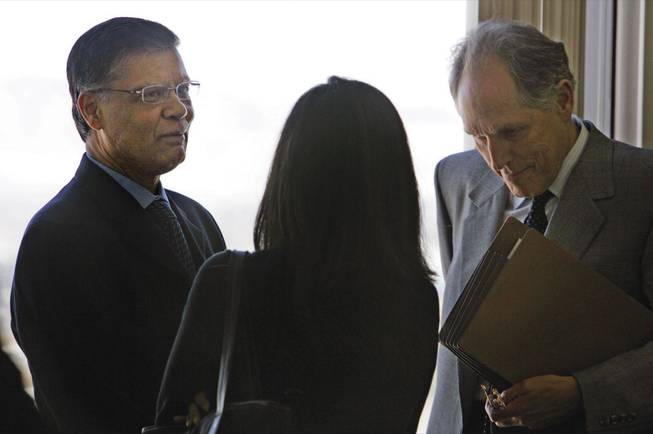
Dr. Dipak Desai, who owned the Endoscopy Center of Southern Nevada, talks last year with attorney Richard Wright. Desai has not given a deposition in the case; an attorney this year invoked his Fifth Amendment right on his behalf.
Saturday, May 9, 2009 | 2 a.m.
Sun Topics
Sun Archives
- A push for open outbreak litigation (4-8-2009)
- Attorneys hope to lift malpractice damages cap (3-31-2009)
- Citing dangerous care, state board mulls suspension of Vegas surgeon (3-10-2009)
- Hepatitis outbreak spurs moves to toughen regulation (3-1-2009)
- Deadline spurs endoscopy lawsuits (2-28-2009)
- For malpractice info, you'll have to phone (3-9-2008)
- Officials: Hepatitis outbreak highlighted need for changes (2-4-2009)
- Doctor faces charges in usage of drugs (12-15-2004)
- Boards' failure to discipline could cost Nevadans (10-16-2003)
Sun Coverage
Plaintiffs’ attorneys in the massive endoscopy litigation filed court papers this week asking a judge to lift a year-old confidentiality order that has kept key depositions under wraps.
The attorneys contend in the papers that the order has hindered their efforts to uncover more evidence in last year’s hepatitis C outbreak at the Endoscopy Center of Southern Nevada and has prevented the public from learning important information about the life-threatening health crisis.
In an April 8 Sun story, attorneys complained that the order, signed by District Judge Allan Earl, allowed attorneys defending the clinic and its physicians to declare any deposition confidential without a valid reason. This flies in the face of a campaign, led by Nevada Supreme Court Chief Justice James Hardesty, for more transparency in the courts.
In their court papers, the plaintiffs’ attorneys listed 15 depositions they wanted made public, including those of Dr. Dipak Desai, who ran the endoscopy center, and his partners, Eladio Carrera, Clifford Carol and Vishvinder Sharma. All four physicians asserted their Fifth Amendment rights against self-incrimination and refused to answer questions because of ongoing criminal investigations. One of Desai’s attorneys, Margaret Stanish, took the Fifth on his behalf March 30, contending he was too ill to do it himself.
Other depositions, such as those of Dr. Javaid Anwar and Dr. Ikram Khan, owners of Quality Care Consultants, are said to be packed with information. Their company, a defendant in the case, was hired by Desai to inspect his clinics before the hepatitis outbreak.
The depositions of Brian Labus, the Southern Nevada Health District’s chief epidemiologist, and Dr. Lawrence Sands, the county’s chief health officer, were not included on the plaintiffs’ list because their lawyers have taken the confidentiality fight in their cases to the Supreme Court.
The decision on whether to open the 15 listed depositions now rests with District Judge Elizabeth Gonzalez, who has temporarily taken over the case while Earl deals with health problems.
The plaintiffs’ attorneys think they have found an ally in Gonzalez on this issue.
In their papers, they reminded the judge that she “expressed shock and dismay” in court last month when she heard about the broad confidentiality order.
•••
In a document he filed with Nevada Supreme Court, Las Vegas lawyer Robert Lueck asked the question every layperson who has read a court document has wanted to ask: “Does anybody in the legal profession read and use plain English anymore?”
Lueck said it to make the point that the language of the Nevada Constitution is pretty straightforward, that it means what it says and says what it means regardless of an opposing lawyer’s attempt to rewrite it in legalese.
Last month, Lueck asked the Nevada Supreme Court to consider taking away Robert Teuton’s family court judgeship. Teuton was appointed by Gov. Jim Gibbons in August to finish the term of retired Family Court Judge Gerald Hardcastle.
Lueck argues that under the Nevada Constitution, Teuton’s appointment expired Jan. 5 because he didn’t run in the November general election.
But Attorney General Catherine Cortez Masto contends that Teuton was unable to run in November because he was appointed too late, by law, to get his name on the November ballot. Therefore, his term expires in January 2011, following the November 2010 general election.
In court papers, Cortez Masto’s solicitor general, C. Wayne Howle, says Lueck’s petition is “an improvident and pointless exercise” that has no business being at the Supreme Court.
Howle surmises that there is no controversy for the high court to resolve, other than the one created in Lueck’s mind.
That’s what prompted Lueck’s pointed question about the legal profession’s English skills.
“The Nevada Constitution grants only the power to the ... governor to appoint a judge or justice for a very limited term, until the first Monday in January following the next general election,” Lueck continued.
“The appointed judge’s term ends on that date. Period. Not hard to understand and not hard to apply: Judge Teuton was appointed in August 2008. He took office in September 2008. The next general election was Nov. 4, 2008, and the first Monday in January was Jan. 5, 2009. End of story.”

Join the Discussion:
Check this out for a full explanation of our conversion to the LiveFyre commenting system and instructions on how to sign up for an account.
Full comments policy